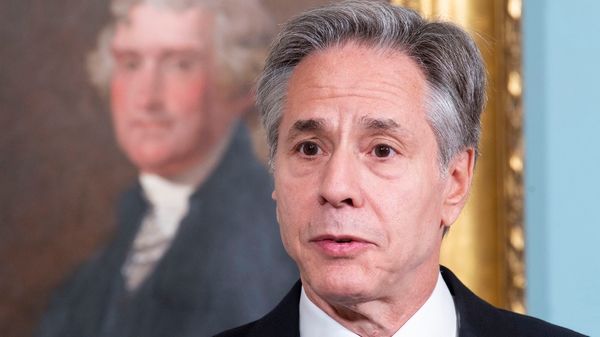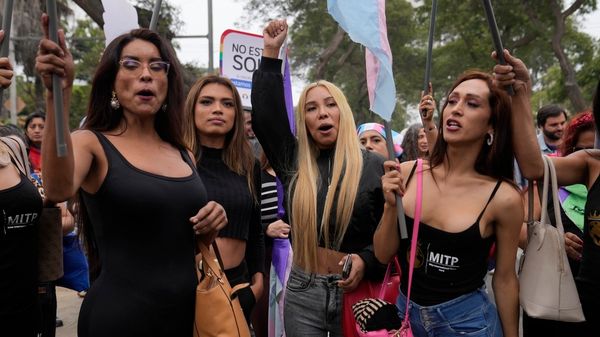February 24, 2011
Fallout from Obama's DOMA Decision :: Court Cases and 2012
Kilian Melloy READ TIME: 9 MIN.
U.S. Attorney General Eric Holder announced yesterday that the Obama Administration had determined it would not defend an anti-gay 1996 federal law, the "Defense of Marriage" Act (DOMA), because President Obama views the act as unconstitutional. The decision is likely to have far-reaching consequences, from how courts respond to cases involving GLBT equality to how the next presidential election plays out in 2012.
Under the provisions of DOMA, which was signed into law by then-president Bill Clinton, the federal government may not legally recognize gay and lesbian families. That means that even those same-sex couples that are married in the five states where family parity is legal can only access state-level benefits and protections related to matrimony. The law also allows states to ignore marriages granted in other jurisdictions. Section 3 of the law defines marriage as a legal union of one man and one woman.
But the Obama Administration effectively declared that DOMA violates the Fifth Amendment's equal protection clause, and lays the groundwork for a legal standard that requires compelling evidence to justify anti-gay laws and policies.
The reasoning behind the Obama Administration's decision was a legal yardstick called a standard of review. The lawsuits in question were filed with the Second Court Attorney General Eric H. Holder. Jr., made a statement on Feb. 23 on the decision not to defend the law.
"In the two years since this Administration took office, the Department of Justice has defended Section 3 of the Defense of Marriage Act on several occasions in federal court," Holder noted. "Each of those cases evaluating Section 3 was considered in jurisdictions in which binding circuit court precedents hold that laws singling out people based on sexual orientation, as DOMA does, are constitutional if there is a rational basis for their enactment. While the President opposes DOMA and believes it should be repealed, the Department has defended it in court because we were able to advance reasonable arguments under that rational basis standard.
"Section 3 of DOMA has now been challenged in the Second Circuit, however, which has no established or binding standard for how laws concerning sexual orientation should be treated," Holder's statement continued. "In these cases, the Administration faces for the first time the question of whether laws regarding sexual orientation are subject to the more permissive standard of review or whether a more rigorous standard, under which laws targeting minority groups with a history of discrimination are viewed with suspicion by the courts, should apply."
By declaring that a standard of review based on the authenticity of the GLBT community as a distinct group, and by acknowledging that GLBTs have historically suffered discriminatory treatment, President Obama took a significant step that has the potential to re-cast how GLBT individuals, families, and issues are viewed by the courts.
White House press secretary Jay Carney said that the decision would have an immediate effect on cases beyond those in the Second Circuit. "The decision is that we will - the administration will not defend the Defense of Marriage Act in the Second Circuit," Carney affirmed, adding, "Furthermore, the president directed the Attorney General not to defend, because of the decision that it's not constitutional, defend the Defense of Marriage Act in any other circuit, in any other case."
The decision constitutes a public statement on the nature of homosexuality that is likely to ruffle feathers among the anti-gay religious community, which often justifies prejudice directed at GLBTs by claiming that homosexuality is no more than a matter of chosen sexual conduct. Arguments promoting faith-based discrimination against GLBTs often rely on a premise that rejects the life experience of gays themselves: homosexuals say that they are innately, powerfully, and irreversibly predisposed to romantic and sexual attraction to others of the same gender.
By declaring in no uncertain terms that DOMA is unconstitutional and that court cases involving the rights of GLBTs should be subjected to the "heightened scrutiny" that comes with a stricter standard of review, the Obama administration forcefully upheld what gays--and science--say about the matter: that GLBTs are a distinct, genuine segment of the population who cannot simply "choose" not to be who they are by their natures. As such, laws that harm them and their families are discriminatory and require significant proof of their necessity in order to be legally justifiable. In short, GLBTs are a genuine minority group, and as such are eligible for protections from the whims of the majority that might affect their rights and legal status.
A Feb. 24 San Francisco Chronicle article noted that the Obama Administration's choice not to defend DOMA would likely have judiciary consequences that reached far beyond the Second Circuit.
"This will impact every case" involving parity for gay and lesbian families, according to UCLA's Brad Sears, who heads up the Williams Institute, which is dedicated to legal issues surrounding sexual orientation. Such cases could include not only cases relevant to marriage equality, but also to adoption rights and immigration sponsorship for same-sex families in which one member is a foreign national.
"The courts will pay attention," added Sears.
The decision directly affects a suit in which a Massachusetts federal judge declared DOMA unconstitutional because the federal statute dictated a definition of marriage to the states. The San Francisco Chronicle reported that the Justice Department would no longer proceed with an appeal in the case. Another appeal will also be dropped--a California case in which a federal employee brought suit because she was denied health care coverage for her same-sex spouse.
The article cited Ohio State law professor Marc Spindelman as saying that the decision could make a crucial difference in court challenges not only to Proposition 8--which has already been found unconstitutional in a federal court--but to similar anti-gay laws in other states. To date, voters in 30 states have amended their constitutions in order to deny gay and lesbian families legal recognition of their relationships, and several more states are considering similar amendments. In some cases, the amendments go much further than denying same-sex families marriage equality, denying them any form of legal recognition at all--including civil unions or even domestic partnerships.
Prior to the Obama Administration's decision, the Justice Department had followed a tradition in which the government defends existing laws from legal challenges, even if those laws are contrary to the sitting president's personal views. Obama has said that he is opposed to marriage equality for gay and lesbian families, but that he supports legal recognition for same-sex families in the form of civil unions.
Anti-Gay Groups See Opportunity
Anti-gay groups targeting equality measures for same-sex families saw an opening to advance their cause, noted the San Francisco Chronicle. The House of Representatives might now "get lawyers in the courtroom who actually want to defend the law," said Maggie Gallagher, the chairwomen for the National Organization for Marriage (NOM). The group spent millions in California in 2008 to rescind marriage rights for gays and lesbians, and has spent millions since then in states around the nation where marriage equality is, or might become, legal, in hopes of barring gay and lesbian families from marital parity.
But the immediate effects already indicate that the Obama Administration's de facto expression of support for GLBTs and their families will lend support to efforts to secure full civil parity for gays. The same day as Holder's announcement, advocates for restoring marriage parity in California filed a petition to allow California families to commence marrying once again, even as the appeal on the federal court's verdict regarding Proposition 8 remains ongoing.
Lawyer Theodore Olson, one of the attorneys who challenged Proposition 8 in federal court, pointed to the administration's call for "heightened scrutiny" in cases affecting GLBTs, declaring that the voter-approved measure "cannot survive" such scrutiny. Olson pled for the rights of same-sex families, saying that each day they were denied ""the right to marry [and] the full blessings of citizenship is a day that never can be returned to them."
The current phase of the appeal in the Proposition 8 case is expected to last into next year, when the issue is likely to play a role in the next presidential election. Republicans are sure to capitalize on the decision, but Obama's middle-of-the-road course on GLBT issues had not garnered him much support from the GOP or from anti-gay conservatives, and had angered gay voters who supported him in 2008.
A Feb. 24 New York Times article summarized the dilemma that the Obama Administration resolved by making its decision. "Would the president instruct the nation's lawyers to stop defending the law, which Mr. Obama has long called unfair, and risk a renewed battle over a simmering social issue?" wrote Michael D. Shear. "Or would he continue to defend the law at the cost of once again disappointing his base?
"The president chose to drop any pretense that his administration supports the marriage act," Shear continued. "As the cases move forward, the Justice Department will no longer argue it is constitutional."
The article noted that John Boehner's spokesperson, Michael Steel, had criticized Obama for the decision during a time of ongoing economic crisis.
"While Americans want Washington to focus on creating jobs and cutting spending the president will have to explain why he thinks now is the appropriate time to stir up a controversial issue that sharply divides the nation," said Steel.
The same criticism has been leveled at Republican lawmakers in a number of states, especially in New Hampshire, where a majority of voters would rather see state legislators tackle economic issues and leave the state's law permitting marriage equality intact. Despite polls showing overwhelming support for marriage equality, Granite State Republican lawmakers continue to assail the law.
GLBT equality advocates say that there may be some rhetoric, but they expect to see little real backlash. The argument used by the Human Rights Campaign's Fred Sainz echoed the line of argument used to criticize the president, though with a slightly different spin: "Americans overwhelmingly are through fighting culture wars that don't result in jobs, economic prosperity or move the country forward," Sainz told the New York Times. "People that don't focus on pocketbook issues are frittering away their 15 minutes of attention."
The article deemed such predictions "wishful thinking," and noted that a poll conducted by the Associated Press last summer found that a bare majority--only 52%--of the electorate favor granting gays and their families full civil equality. The article noted that, "[T]there is no reason why a Republican candidate in 2012 couldn't use it as a wedge issue against Mr. Obama."
Already, anti-gay conservatives who may wish to make gays and their families a campaign focus once again are making claims to "morality". Pat Buchanan declared it a "moral" matter and said that Obama had "capitulated" to gays, a word frequently used by anti-gay conservatives to characterize the victories of equality-minded politicians.
In the meantime, however, some speculate that Obama's position on gay marriage is "evolving" just in time to win him renewed support from the GLBT community. Anti-gay politicians have, over the course of the last two years, defended their views by saying that their stance on marriage equality is "the same as that of the president," but in an interview last year the president told gay blogger Joe Sudbay of America Blog that his position on marriage equality is something that he still ponders.
"I have been to this point unwilling to sign on to same-sex marriage primarily because of my understandings of the traditional definitions of marriage," Obama told Sudbay. "But I also think you're right that attitudes evolve, including mine," Obama added. "And I think that it is an issue that I wrestle with and think about because I have a whole host of friends who are in gay partnerships. I have staff members who are in committed, monogamous relationships, who are raising children, who are wonderful parents."
The president went on to say that he was "not prepared to reverse myself here, sitting in the Roosevelt Room at 3:30 in the afternoon," but that the issue remains "something that I think a lot about."
Obama's words sent an instant frisson through the GLBT world, and the mainstream media took note. An Oct. 28 New York Magazine article by Dan Amira openly dismissed as "disingenuous" the distinction Obama makes when he says he upholds civil unions but not marriage equality.
Titled, "President Obama Getting Closer to Ending His Pretend Opposition to Gay Marriage," the article noted that Obama had opposed Proposition 8, the 2008 ballot initiative that rescinded marriage rights for gay and lesbian families in California. The article also tallied the president's record of support for GLBT equality, and recalled that in 1996 Obama answered a questionnaire that asked about marriage equality by saying that he would be in favor of it.
"When you add it all up, the only conclusion that really makes sense is that, in his heart, Obama is fine with gay marriage, but didn't think the nation was ready for a president who felt that way," Amira wrote. The article then went on to say, "Approval of gay marriage surged, it was legalized in a number of states, and Obama's support for civil unions, which would have been considered relatively enlightened five or ten years ago, began to seem downright antiquated to many people."
Amira speculated that the comment might herald an open declaration of support for marriage equality in 2012. Given the social shift, a pro-marriage stance from Obama would "be inherently mainstream."
Kilian Melloy serves as EDGE Media Network's Associate Arts Editor and Staff Contributor. His professional memberships include the National Lesbian & Gay Journalists Association, the Boston Online Film Critics Association, The Gay and Lesbian Entertainment Critics Association, and the Boston Theater Critics Association's Elliot Norton Awards Committee.







